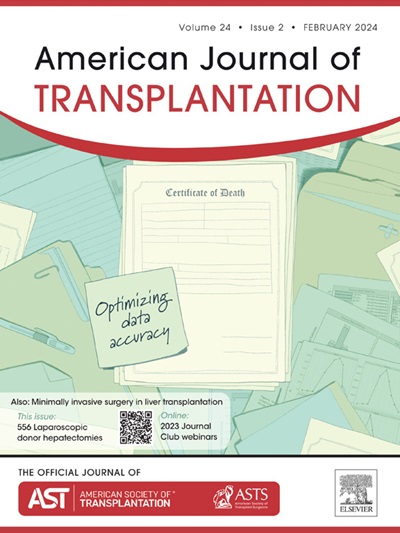肾移植候选者遗传病评估:实践资源。
IF 8.2
2区 医学
Q1 SURGERY
引用次数: 0
摘要
临床认可的肾脏疾病基因检测方法越来越多,推动了这些检测方法在肾移植实践中的应用。但无论是检测方案还是应使用基因检测的患者人群都尚未确定,而且基因检测在肾移植评估中的价值也未得到证实。肾移植服务提供者可能并不总能意识到基因检测的局限性,在理解检测结果和提供咨询方面可能需要指导,因为许多中心并不容易找到肾脏遗传咨询师或临床遗传学家。在这一实践资源中,由肾脏病专家、遗传学家和遗传咨询师组成的工作小组为基因检测提供了一种务实的、量身定制的方法,主张只有在基因诊断或排除基因诊断会影响移植或移植后管理的选择,或影响遗传性疾病风险增加的活体捐赠候选者的检查时,才使用基因检测。本文章由计算机程序翻译,如有差异,请以英文原文为准。
Evaluation for genetic disease in kidney transplant candidates: A practice resource
The increasing availability of clinically approved genetic tests for kidney disease has spurred the growth in the use of these tests in kidney transplant practice. Neither the testing options nor the patient population where this should be deployed has been defined, and its value in kidney transplant evaluation has not been demonstrated. Transplant providers may not always be aware of the limitations of genetic testing and may need guidance on comprehending test results and providing counsel, as many centers do not have easy access to a renal genetic counselor or a clinical geneticist. In this practice resource, a working group of nephrologists, geneticists, and a genetic counselor provide a pragmatic, tailored approach to genetic testing, advocating for its use only where the genetic diagnosis or its exclusion can impact the choices available for transplantation or posttransplant management or the workup of living donor candidates at increased risk for heritable disease.
求助全文
通过发布文献求助,成功后即可免费获取论文全文。
去求助
来源期刊
CiteScore
18.70
自引率
4.50%
发文量
346
审稿时长
26 days
期刊介绍:
The American Journal of Transplantation is a leading journal in the field of transplantation. It serves as a forum for debate and reassessment, an agent of change, and a major platform for promoting understanding, improving results, and advancing science. Published monthly, it provides an essential resource for researchers and clinicians worldwide.
The journal publishes original articles, case reports, invited reviews, letters to the editor, critical reviews, news features, consensus documents, and guidelines over 12 issues a year. It covers all major subject areas in transplantation, including thoracic (heart, lung), abdominal (kidney, liver, pancreas, islets), tissue and stem cell transplantation, organ and tissue donation and preservation, tissue injury, repair, inflammation, and aging, histocompatibility, drugs and pharmacology, graft survival, and prevention of graft dysfunction and failure. It also explores ethical and social issues in the field.

 求助内容:
求助内容: 应助结果提醒方式:
应助结果提醒方式:


